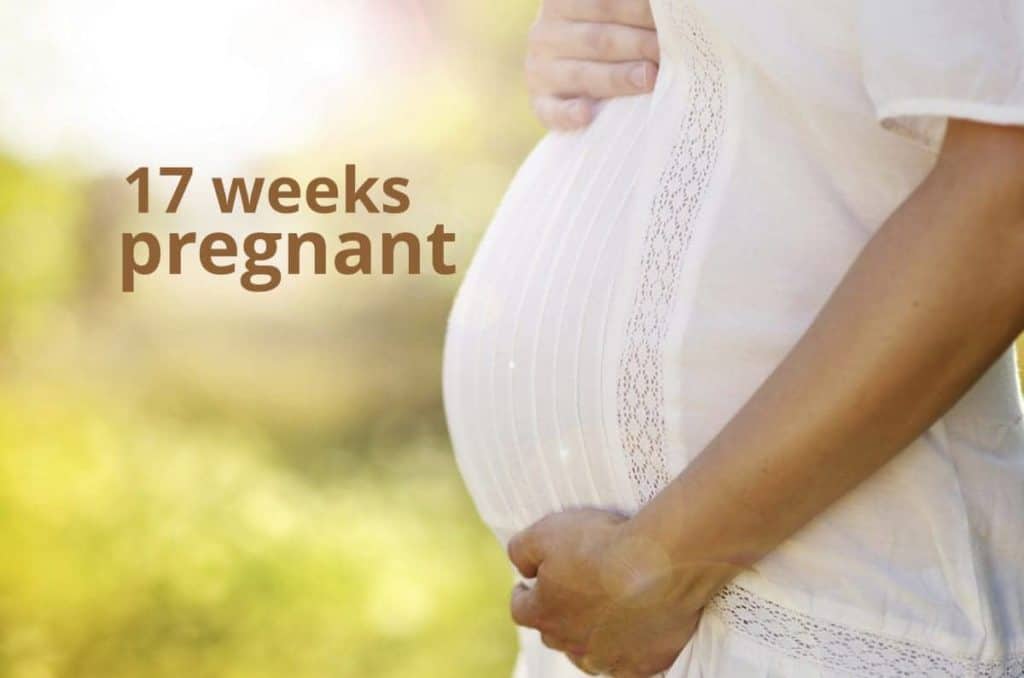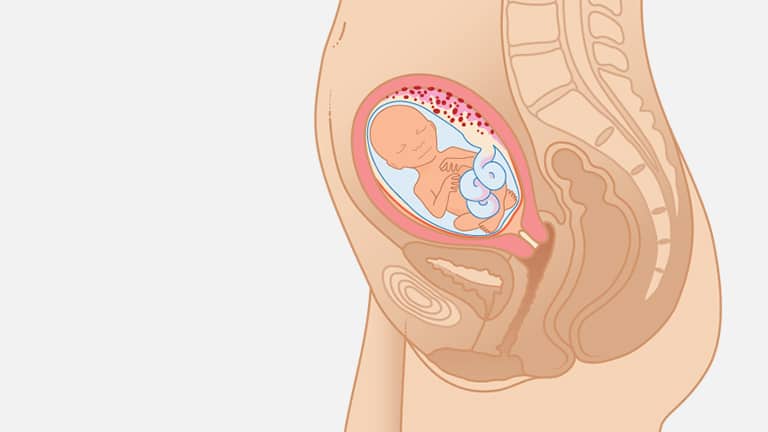
Table of Contents
Congratulations, you’ve reached the 17-week mark of your pregnancy journey! This is an exciting time, but it’s completely normal to feel a mix of excitement and a touch of nervousness. Rest assured, we’re here to address all your questions and concerns about being you and your baby at 17 weeks pregnant.
At this stage, your little one weighs approximately 4.49 ounces and measures around 5.1 inches from head to toe. That’s some steady growth happening in there! One of the most magical moments of this phase is feeling those tiny kicks from your baby. It’s like a gentle reminder that your baby is honing some important skills – they’re practicing the art of sucking, kicking, and swallowing, which are essential survival tactics once they arrive.
Check out: When Do You Feel Baby Move: A Guide To Fetal Movement and Kick Counts
So, embrace this special time in your pregnancy journey, and if you have any questions or concerns, don’t hesitate to reach out. We’re here to support you every step of the way!
What Is Happening To Your Baby At 17 Weeks Pregnant ?
As you hit the midpoint of your pregnancy, your little one is on an incredible journey of development. Think of it as a dress rehearsal for life outside the womb. Here are a few more exciting things happening with your baby:
1. Bone Development
At 17 weeks pregnant, your baby’s skeleton is going through a transformation, shifting from being made of soft cartilage to becoming solid bone. You can help both your baby’s bone development and your own by including foods that are rich in calcium in your diet. Plus, having an adequate intake of calcium can also lower your chances of experiencing hypertension and a condition called preeclampsia during pregnancy. So, it’s a win-win for both you and your little one to make sure you’re getting enough calcium in your meals.
Check out: 14 Best Prenatal Vitamins of 2023: Everything an Expecting Mother Needs!
2. Sweat Glands
Is it warm inside the womb? Well, let’s talk about the baby’s sweat glands at 17 weeks of pregnancy. The truth is, that babies don’t sweat while they’re still in the womb. It’s only after they’re born that their little sweat glands start doing their job. And even then, it might take a couple of weeks for all the necessary hormones to kick in and get the sweating process going. So, until then, it’s not sweat city in there!
3. Sucking and Swallowing
So how’s your baby at 17 weeks pregnant planning on spending their days? They practice sucking and swallowing in preparation to get fit for life outside the womb, and the very first efforts to get milk from the breast or bottle. Many babies also start to suck their thumbs inside their womb.
4. Umbilical Cord
When you’re around 17 weeks into your pregnancy, this cord is getting stronger and bigger. It needs to be sturdy because it has an important job to do during the second trimester and beyond. As your pregnancy progresses, the umbilical cord will grow to about 9 inches in length and be roughly an inch thick. Now, here’s the cool part: Inside that cord, there’s a vein that carries oxygen-rich blood and essential nutrients from you to your growing baby.
But that’s not all. Two arteries in the cord carry away waste products, like carbon dioxide, from your baby back to the placenta. The placenta acts like a filter, cleaning up the blood and sending it back to you, so the cycle can continue.
5. Your little one is listening!
Somewhere between the 16th and 22nd week of pregnancy, your baby’s ears start picking up sounds from inside your body. That includes things like your heartbeat, the whooshing of your breath, and even the gurgling of your tummy as it digests food. It’s like they’re getting an early introduction to the sounds of the world, starting from the cozy comfort of your belly.
17 Weeks Pregnant Symptoms
What Happens To A Mother In The 17th Week Of Pregnancy?
You’re in the happy time of your pregnancy at 17 weeks of pregnancy. Your nausea may have decreased, and you do not experience several of the uneasiness that comes later in your pregnancy. So cherish every moment!
1. Braxton Hicks Contractions
Just like your baby at 17 weeks pregnant, your body is still practicing labor. So-called Braxton Hicks contractions are realistic contractions that you can feel as frequently as it is now. They seem like squeezing around your stomach as you put on a snug, rigid dress, except on the inside. They’re unusual, too. If you start having daily Braxton Hicks at 17 weeks and they get more serious, contact your healthcare professional.
Also read: Braxton Hicks Contractions v/s Real Contraction: What They Feel Like, Symptoms and Identification
2. Baby Starts To Kick
Around 17 weeks and 22 weeks of pregnancy, some people begin to experience a baby kick! Baby’s motions may at first seem like gas or hunger pangs, but you’ll start to understand it. It’s called the quickening.
For hundreds of years, this wiggly movement of your baby at 17 weeks pregnant indicated that a woman was pregnant, and experiencing the vibrations of a baby for the first time was believed to be the second most important occurrence in pregnancy after delivery.
3. Increased Melanin
Your body is producing more melanin because of the higher levels of estrogen during pregnancy. This might be causing a pregnancy mask on your face or a dark line down the center of your abdomen known as “linea nigra.” The good news is, this line will fade away after you give birth.
4. Morning Sickness
At 17 weeks of pregnancy, most people consider morning sickness to be a regular occurrence. Morning illness that occurs in the second trimester is something you can explain to your doctor. If it is serious, it may have hyperemesis gravidarum—mainly morning steroid disease. With HG, you are at risk of dehydration and deficiency, so it is vital to obtain medical help.
5. Stretch Marks
You can get some stretch marks as your skin expands during pregnancy. Regretfully, there’s almost nothing you can do to avoid them completely—the type of skin, genetic inheritance, and excess weight have more to do with stretch marks than any cosmetic ingredient. It’s not a bad thing to keep your skin drenched and moisturized. The stretch marks might look dark, but they eventually go away.
Also read: 11 Best Stretch Mark Creams For Pregnancy 2023
6. Zzz…
You can sleep better now! Once you’re in your second trimester, try to sleep on your side. It’s the most comfortable position and it’s good for your baby too. Sleeping on your side puts less pressure on your veins and organs, which means that blood flows better to your uterus. This helps your baby get all the nutrients and oxygen they need. So, enjoy that restful sleep and start snoozing on your side if you haven’t already!
Check out: The Best Sleeping Positions During Pregnancy
7. Lightheaded or Dizziness
Are you feeling lightheaded or the world seems to spin around you? Don’t worry; this is quite normal during the second trimester of pregnancy as changes happen in your cardiovascular system as your body adapts to the demands of pregnancy. Your heart beats a bit faster, your blood vessels expand to carry more blood, and there are temporary shifts in how blood circulates. But fear not!
We’ve got some tips on how to deal with dizziness during pregnancy
8. Changes in Vision
You might have noticed that your vision isn’t as sharp as usual, and your eyes feel a bit dry. It might sound strange, but these vision changes are pretty normal during pregnancy. Here’s why: When you’re pregnant, your body goes through a lot of hormonal shifts, and changes in metabolism, and you might retain more fluids. All of these things can have an impact on your eyes and how well you see.
Now, the good news is that these changes are usually not a big deal, and they’ll clear up after you’ve had your baby. But, there’s a small chance that sometimes, vision changes can be a sign of a more serious issue. So, it’s always a good idea to have a chat with your midwife or doctor if you notice things like blurry vision, temporary loss of vision, double vision, or anything else that just doesn’t seem right.
9. Itchy Skin
Feeling itchy during the 17th week or so? Don’t worry; it’s quite common, especially around areas like your breasts and belly, which are stretching as your baby grows. Sometimes, if you have eczema, it can get worse and add to the itchiness. But there are ways to soothe it.
You can try using an ice pack or a cold cloth on the itchy spot, which can provide some relief. Another trick is to use fragrance-free lotion, and for an extra cooling effect, you can pop it in the fridge before applying. And here’s a cozy option: taking a warm oatmeal bath can also help calm the itch.
However, if you find yourself extremely itchy or notice a new rash, it’s essential to reach out to your healthcare provider for guidance and reassurance.
Also read: Itchy Feet During Pregnancy: Causes, Symptoms, & Treatments
17 Weeks Pregnant Your Baby Bump Looks Like…

What Would Your Belly Look Like In The 17th Week Of Pregnancy?
When you’re 17 weeks pregnant, your baby bump may not be noticeable yet. Some women at this stage don’t show much, and there’s a wide range of experiences.
How your body looks and how much weight you’ve gained are important things to think about. If you’ve been pregnant before, you might start showing earlier than someone pregnant for the first time.
The most important thing, though, is that you and your baby at 17 weeks pregnant are developing as expected. A healthy pregnancy is the goal, no matter what your belly looks like. So enjoy every moment of your pregnancy and create wonderful memories. This is a special time in your life, so make the most of it!
Check out: Know Your Pregnancy Baby Bump: 10 Fun Facts About Your Baby Bump
A Note For Our Readers
Pregnancy is a beautiful feeling, you should keep yourself relaxed and calm amidst all the anxiety happening within you. This is the time when you should be the happiest so that your and the baby’s health is right on track. Don’t take stress or get worked up for the upcoming weeks. Prepare yourself for welcoming your little angel. From getting their nurseries done to deciding what color room they would have, prepare yourself for everything!










